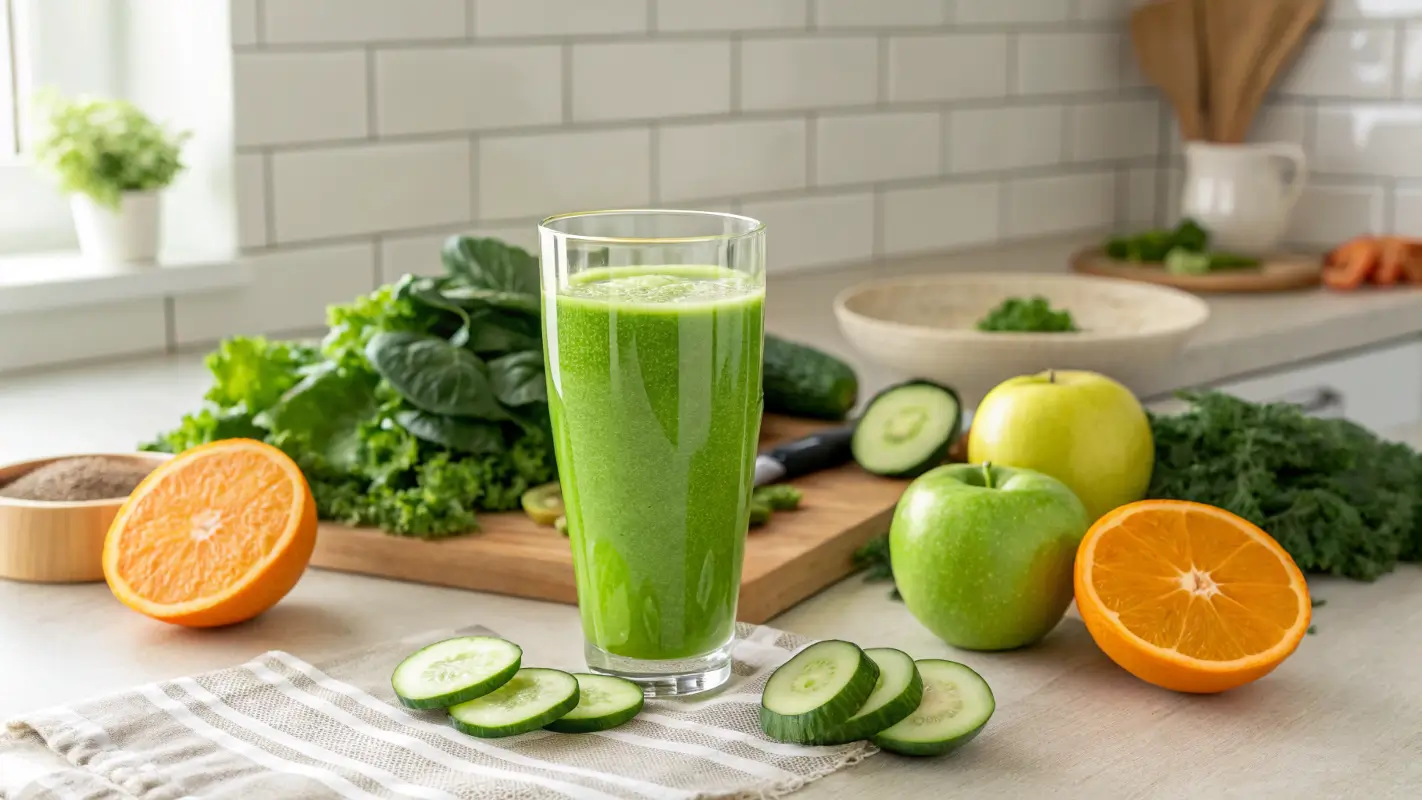Table of Contents
Are you looking for a tasty yet effective way to support your weight loss journey? Juicing is not only a refreshing and hydrating way to get your daily nutrients, but it can also aid in shedding some extra pounds. In this article, we’ll dive into the world of juicing recipes for weight loss, exploring nutrient-dense ingredients, fat-burning combinations, and everything you need to know to make the most of your juicing routine. So, let’s get started!
Understanding Juicing and Weight Loss
What is Juicing?
Juicing is the process of extracting liquid from fruits and vegetables to create refreshing, nutrient-packed beverages. Unlike smoothies, which include the entire fruit or vegetable with its fiber, juicing separates the pulp, giving you a drink that’s lighter but still full of vitamins, minerals, and antioxidants.
Juicing allows you to pack a lot of nutrients into one glass. It’s a quick way to get your daily servings of fruits and vegetables, especially if you’re not a fan of eating them whole. When done right, it can help with weight loss by providing low-calorie yet filling beverages that keep you energized and satisfied.
How Juicing Supports Weight Loss
You may be wondering how exactly juicing helps with weight loss. Here’s the thing: while juicing doesn’t promise instant results, it can be a powerful tool when combined with a healthy diet and exercise routine.
- Nutrient Density: Fresh juice is packed with essential nutrients such as vitamins, antioxidants, and minerals. These nutrients boost your metabolism, support digestion, and help you feel fuller longer—making it easier to stick to your weight loss goals.
- Calorie Control: Juices made with fruits and vegetables are generally low in calories, meaning you can drink them without worrying about consuming excess calories. For instance, a glass of green detox juice is a light, healthy option that satisfies your thirst without spiking your calorie intake.
- Digestive Health: Certain fruits and vegetables, like ginger or kale, are known for their digestive benefits. When you juice them, you make it easier for your body to absorb their fiber and nutrients, supporting healthy digestion.
- Hydration and Metabolism Boost: Many fruits and vegetables have high water content, which helps with hydration. Staying hydrated is essential for metabolism, and drinking juices can be an easy, tasty way to support it.
Considerations Before Starting a Juicing Regimen
While juicing is a wonderful tool, it’s important to consider a few things before you dive into your juicing journey.
- Consult with a Healthcare Professional: If you have any underlying health conditions or are taking medication, it’s always a good idea to speak with your doctor before drastically changing your diet.
- Balanced Diet: Juicing should never be seen as a complete replacement for whole foods. It’s best when used as a supplement to a balanced diet, not as a sole method of weight loss.
- Variety is Key: Stick to a variety of fruits and vegetables to ensure you’re getting a wide range of nutrients. Relying solely on fruit juices could lead to an excess of sugars, so balance is important.
Essential Ingredients for Weight Loss Juices
Leafy Greens: The Powerhouses of Your Juices
When it comes to juicing recipes for weight loss, leafy greens are some of the most powerful ingredients you can include. Rich in vitamins, minerals, and fiber, they not only provide essential nutrients but also help to support digestion and weight management. Some popular leafy greens to consider are:
- Spinach: High in iron and calcium, spinach is packed with nutrients that help to boost metabolism and aid in digestion. It’s also a low-calorie option, making it a great addition to any weight loss juice.
- Kale: This super green is loaded with fiber and antioxidants. It’s an excellent source of vitamins A, C, and K, all of which contribute to overall health while supporting a healthy weight.
- Swiss Chard: With high levels of magnesium and potassium, Swiss chard can support muscle function and help with hydration. It also adds a mild, pleasant flavor to your juice.
Citrus Fruits: A Tangy Touch for Fat-Burning
Citrus fruits are not only refreshing and delicious, but they’re also packed with vitamin C, which plays a key role in boosting your metabolism and burning fat. Some great citrus options for juicing include:
- Oranges: Known for their immune-boosting properties, oranges are also rich in fiber and water content, making them perfect for weight loss juices. They help promote fullness, reducing the temptation to snack between meals.
- Grapefruit: Often associated with weight loss, grapefruit contains antioxidants and has a high water content. It helps detoxify the body, improve digestion, and aid in fat-burning.
- Lemons: A fantastic addition to almost any juice, lemons are packed with vitamin C and can help curb hunger. Their natural detoxifying properties support weight loss by cleansing the body.
Berries: Antioxidant-Rich and Sweet
Berries are not only sweet and satisfying but also full of antioxidants that support fat loss and improve metabolism. Some berries you can add to your juicing recipes are:
- Blueberries: Packed with antioxidants, blueberries help to combat oxidative stress and inflammation, which can hinder weight loss. They also improve insulin sensitivity, helping to regulate blood sugar levels.
- Strawberries: These juicy delights are high in vitamin C and low in calories, making them a great option for a fat-burning juice. Their sweetness also adds a natural flavor to your juice, so you won’t need to add excess sugar.
- Raspberries: High in fiber, raspberries are excellent for digestion and weight management. Their natural sweetness also helps balance out the tartness of other juicing ingredients.
Root Vegetables: Nutrient-Dense and Filling
Root vegetables are great for adding richness and fullness to your juices, as they are naturally high in fiber and vitamins. Here are a few to consider:
- Carrots: High in beta-carotene and vitamin A, carrots help improve your skin and support your immune system. Their natural sweetness makes them a fantastic base for many juice recipes.
- Beets: Known for their detoxifying qualities, beets are high in antioxidants and support healthy liver function, which can help with weight loss. They also add a beautiful deep color to your juice.
- Ginger: Although not technically a root vegetable, ginger is often used for its natural ability to boost metabolism, aid digestion, and help reduce inflammation. It adds a zesty kick to any juice and can help promote fat-burning.
Herbs and Spices: Flavor with Benefits
Don’t forget to include herbs and spices in your juicing recipes. Not only do they add flavor, but many have fat-burning and detoxifying properties:
- Mint: Mint has been shown to improve digestion, reduce bloating, and freshen your breath. Adding a few mint leaves to your juice can provide a refreshing taste.
- Turmeric: Known for its anti-inflammatory benefits, turmeric can help reduce inflammation in the body, which may contribute to weight gain. It also supports liver function, which is crucial for detoxifying the body.
- Cayenne Pepper: A dash of cayenne pepper in your juice can help boost metabolism and support fat-burning due to its capsaicin content.
Top Juicing Recipes for Weight Loss
1. Green Detox Juice
Ingredients:
- 1 cup of kale
- 1 cucumber
- 1 green apple
- 1 lemon
- A small piece of ginger (about 1-inch)
Preparation:
- Wash all ingredients thoroughly.
- Peel the cucumber and lemon, and core the apple.
- Add all the ingredients into your juicer.
- Juice and enjoy!
Health Benefits:
This juice is packed with vitamins A, C, and K, making it perfect for boosting your immune system while supporting digestion. The ginger adds a metabolism-boosting kick, while the cucumber and apple offer hydration and natural sweetness.
2. Citrus Berry Blast
Ingredients:
- 2 oranges
- 1 cup of strawberries
- A handful of mint leaves
Preparation:
- Peel the oranges and add them to the juicer.
- Remove the stems from the strawberries and add them as well.
- Juice the mint leaves with the fruit.
- Stir and enjoy this refreshing, fat-burning drink!
Health Benefits:
This juice is full of vitamin C, which not only boosts your immune system but also aids in fat burning. Strawberries and oranges have a low glycemic index, meaning they won’t spike your blood sugar levels, making them ideal for weight loss.
3. Carrot-Apple-Ginger Zing
Ingredients:
- 3 carrots
- 2 green apples
- 1-inch piece of ginger
- 1 lemon
Preparation:
- Wash the carrots and peel them if necessary.
- Core the apples and peel the ginger.
- Juice all ingredients and enjoy!
Health Benefits:
Carrots and apples are rich in fiber and low in calories, making this juice a perfect option for weight loss. The ginger adds anti-inflammatory properties and helps boost digestion, while the lemon promotes detoxification.
Incorporating Juices into Your Weight Loss Plan
When to Consume Juices
To maximize the benefits of juicing for weight loss, it’s essential to know when to consume your juices. You can enjoy them as a snack between meals or as a replacement for sugary beverages like soda. For best results, try drinking juice first thing in the morning or before meals to kickstart your metabolism and curb appetite. After a workout is also an ideal time to hydrate and replenish nutrients.
Balancing Juices with Solid Foods
While juices are nutrient-packed, they don’t provide the protein and healthy fats your body needs for sustained energy. Juices should be seen as a supplement to a balanced diet. Pair them with whole foods such as lean proteins, whole grains, and healthy fats to ensure your body gets the full range of nutrients.
Monitoring Caloric Intake
Juices can be low in calories, but it’s important to track your intake if you’re looking to lose weight. Be mindful of the ingredients you’re using—some fruits can be high in sugar. Balance fruit-heavy juices with vegetables like spinach, kale, or cucumber to keep the calorie count in check while still providing all the necessary nutrients.
Potential Risks of Juicing for Weight Loss
Overconsumption of Fruit Juices
While fruits are packed with vitamins and nutrients, they can also be high in natural sugars. Consuming fruit-based juices in excess can lead to a sugar overload, potentially raising blood sugar levels and contributing to weight gain. Although the sugar in fruits is natural, it’s still essential to maintain balance.
How to Mitigate This Risk:
- Balance with Vegetables: When making your juices, focus on adding more vegetables, especially leafy greens like spinach and kale, which are low in sugar and high in fiber.
- Limit High-Sugar Fruits: Avoid juicing large quantities of fruits like bananas, grapes, and pineapples, as they can significantly increase the sugar content of your juice.
Lack of Protein and Healthy Fats
Juices are excellent for getting vitamins and minerals, but they lack protein and healthy fats, both of which are essential for a balanced diet and weight loss. Relying solely on juices can leave you feeling hungry and lacking the energy needed for your daily activities.
How to Mitigate This Risk:
- Incorporate Protein and Healthy Fats: Pair your juice with a protein-rich snack, such as nuts, seeds, or a handful of yogurt. This will help maintain your energy levels and prevent cravings.
- Combine Juices with a Balanced Diet: Juices should supplement a well-rounded diet that includes lean protein sources, whole grains, and healthy fats.
Not Suitable for Everyone
Juicing may not be suitable for everyone, especially those with certain health conditions, such as diabetes or digestive disorders. The absence of fiber in juices may not be ideal for individuals needing fiber for digestive health.
How to Mitigate This Risk:
- Consult a Doctor: Before embarking on a juicing regimen, consult with your healthcare provider, especially if you have underlying health issues or concerns about blood sugar levels.
For expert tips on juicing for weight loss, explore this informative guide on Healthline: Juicing for Weight Loss.
Tips for Getting the Most Out of Your Juicing Journey
Use Fresh, Organic Ingredients
The fresher and more organic your ingredients, the more nutrients your juice will retain. Organic fruits and vegetables have fewer pesticides and chemicals, which means a cleaner, healthier juice. Whenever possible, opt for organic produce, especially for items like leafy greens and berries.
Invest in a High-Quality Juicer
The type of juicer you use can make a big difference in the quality of your juice. Centrifugal juicers are fast but may heat up the juice, losing some nutrients. On the other hand, masticating juicers (also known as slow juicers) crush and extract juice at a slower pace, preserving more nutrients and enzymes.
Drink Immediately for Maximum Nutrients
Juices are best consumed immediately after juicing to retain all the nutrients. Over time, the juice can oxidize and lose some of its nutritional value. If you must store your juice, keep it in an airtight container in the fridge and consume it within 24 hours.
Experiment with New Combinations
One of the joys of juicing is experimenting with new combinations of fruits and vegetables. Don’t be afraid to try out different flavors and textures. For example, you can add some cucumber to a fruit-heavy juice to make it more hydrating, or toss in a handful of mint for a refreshing twist.
Cleanse Your Juicer Properly
A clean juicer not only ensures that your juice is fresh and free of any bacteria but also helps your juicer work efficiently. Be sure to clean your juicer immediately after use, as leftover pulp can build up and affect its performance.
Frequently Asked Questions About Juicing for Weight Loss
1. Can juicing help me lose weight?
Yes, when combined with a healthy diet and exercise routine, juicing can aid in weight loss. Juices made with vegetables, leafy greens, and fruits are low in calories and high in nutrients, which can help reduce hunger and promote fat-burning. However, it’s important to balance juicing with other healthy eating habits.
2. What juices are best for weight loss?
Green juices, citrus-based juices, and vegetable-rich juices are all great choices for weight loss. Some popular options include:
- Green detox juice with kale, spinach, and cucumber
- Citrus berry blast with oranges, strawberries, and mint
- Carrot-apple-ginger zing with carrots, apples, and ginger
3. Can I juice if I have diabetes?
If you have diabetes, it’s crucial to choose your ingredients carefully. While juicing can provide many health benefits, juices made primarily from fruits may cause blood sugar spikes. Opt for juices with more vegetables and less fruit, such as green juices or celery juice, to avoid blood sugar imbalances.
4. Can I replace all meals with juice for weight loss?
Juices should not be used as meal replacements for extended periods. While they are nutrient-dense, they lack protein and fats that are essential for a balanced diet. Juices should be incorporated into your diet alongside solid meals to ensure you’re getting the necessary nutrients your body needs.
5. How many juices should I drink per day for weight loss?
Drinking 1-2 juices per day is generally enough to see benefits, especially if you’re using them as part of a balanced diet. If you want to cleanse or detox, you can try a juice cleanse for a short period, but it’s essential to not rely solely on juices for your nutritional needs.





